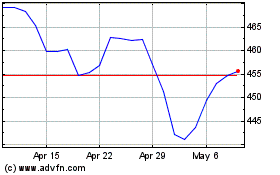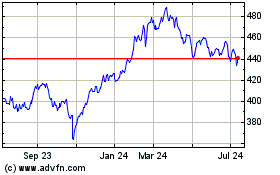Notice of Exempt Solicitation. Definitive Material. (px14a6g)
June 26 2017 - 9:10AM
Edgar (US Regulatory)
June 23
rd
, 2017
Natasha Lamb
Arjuna Capital
49 Central Street
Manchester, MA 01944
978-704-0114, natasha@arjuna-capital.com
Dear MasterCard Shareholders,
We are writing to urge you to
VOTE “FOR” PROPOSAL 6
on the proxy card, which asks the Company to transparently and proactively address the gender pay gap. The proposal makes the following request:
Shareholders request MasterCard prepare a report by November 2017(omitting proprietary information, prepared at reasonable cost) on the Company’s policies and goals to reduce the gender pay gap. The gender pay gap is defined as the difference between male and female median earnings expressed as a percentage of male earnings (Organization for Economic Cooperation and Development).
Supporting Statement: A report adequate for investors to assess MasterCard’s strategy and performance would include the percentage pay gap between male and female employees across race and ethnicity, including base, bonus and equity compensation, policies to address that gap, methodology used, and quantitative reduction targets.
Implementing the Proposal would represent a proactive step towards closing the gender pay gap. We believe the Company would benefit from taking a leadership position on this issue, as research indicates attracting and retaining diverse teams yields strong financial performance benefits.
We believe shareholders should vote “FOR” the proposal for the following reasons:
|
1)
|
Gender pay parity is a significant policy issue:
|
|
|
a.
|
The U.S. Bureau of Labor Statistics reports women who work full time earn an average of 79 cents for every dollar men earn. The gap for African America and Latina women is wider at 60% and 55% respectively.
|
|
|
b.
|
Forecasts indicate that, at the current rate of change, women will not reach pay parity until 2059.
1
|
|
|
c.
|
Regulatory risk exists as the Paycheck Fairness Act pends before Congress. The Equal Employment Opportunity Commission has proposed rules requiring wage gap reporting. Over the last year, California, Massachusetts, New York and Maryland have passed some of the strongest equal pay legislation to date. In the United Kingdom, all companies with more than 250 employees will be required to publish their gender pay numbers by 2018.
2
|
|
2)
|
Issues of gender pay equity are especially salient within the Financial Services sector:
|
|
|
a.
|
Data from the Bureau of Labor Statistics, reveals female financial advisors faced a 61.3% pay gap in 2014, the widest of occupations reviewed.
3
A 2016
Glassdoor
study finds an unexplained 6.4% gender pay gap in the financial industry after statistical controls adjusting for position and seniority, among the highest of industries examined.
4
|
1
https://iwpr.org/wp-content/uploads/2017/03/R476.pdf
2
http://www.theguardian.com/society/2016/feb/12/gender-pay-gap-reporting-big-firms-start-2018
3
http://fortune.com/2015/03/02/jobs-biggest-gender-pay-gaps/
4
https://www.glassdoor.com/research/studies/gender-pay-gap/
|
|
b.
|
Mercer finds female executives are 20 to 30% more likely to leave financial services careers than in any other industry.
|
|
3)
|
MasterCard has a poor track record and controversy around pay parity disclosure and disparities compared to leading Financial Services and S&P 500 peers:
|
|
|
a.
|
MasterCard is reported to have a mean pay gap of 15% or $13,459, per PayScale. For top range earners, that gap is 20%, or $23,132.
5
MasterCard has not published its gender pay gap.
|
|
|
b.
|
Financial services peers Schroders and Virgin Money have published their gender pay gaps. S&P 500 peers including Intel, Apple, Amazon, GoDaddy, Microsoft, Expedia, Adobe, eBay, and Starbucks have all publically reported quantitative gender pay equity disclosures, reporting the percentage pay gap between male and female employees, and the compensation components to which it applies – base, bonus, and/or equity.
|
|
|
c.
|
MasterCard has
merely paid qualitative lip service
to the issue of gender pay equity. The Proponent did not find adequate the information contained within the Company’s opposition statement, which does not address the percentage pay gap between male and female employees, and falls well below the level of disclosures provided by Financial Services and S&P 500 peers.
|
|
|
d.
|
MasterCard’s workforce diversity disclosure fails to explain the disparity between the gender composition of MasterCard’s leadership (25% female) and its broader workforce (40% female). Specifically, the fact that 40% of the company’s global workforce is female, while only 25% of its management team is made up of women suggests that the Company has struggled to attract and retain qualified female employees and promote them into leadership roles.
|
|
4)
|
MasterCard’s failure to manage gender pay parity issues could place the Company at a competitive disadvantage.
|
|
|
a.
|
MasterCard’s operational risk factors relating to gender pay parity issues may include failing to cultivate and retain qualified female employees. Given the pay equity disclosures of its Financial Services and S&P 500 peers, MasterCard is at an operational/competitive disadvantage in its ability to attract and retain top talent. This is particularly salient, as Mercer finds female executives are 20 to 30 percent more likely to leave financial services careers than in any other industry.
|
|
|
b.
|
MasterCard could suffer reputational damage if the company fails to disclose its gender pay gap and set hard targets around ameliorating existing pay parity issues. Reputational damage could result in lost business, damaging shareholder value. Macy’s and Kroger lost business due to boycotts following their announced opposition to progressive gender pay parity legislation in Texas.
6
|
|
|
c.
|
There is a substantial body of research indicating gender diverse teams are more innovative than homogenous teams. If MasterCard fails to create gender diverse teams due to an inability to attract and retain qualified female employees, this could restrict the Company’s ability to innovate.
|
|
|
i.
|
Research from Catalyst and McKinsey indicates that men and women think, lead, and solve problems differently and that a diversity of approaches leads to more innovation and financial results.
7
8
|
|
|
ii.
|
The Journal of Innovation-Management Policy & Practice found that “gender diversity within research teams fosters novel solutions leading to radical innovation in the company and in the market.”
9
|
5
http://www.payscale.com/research/US/Employer=MasterCard_Worldwide/Salary#by_Gender
6
http://www.huffingtonpost.com
7
http://www.catalyst.org/system/files/why_diversity_matters_catalyst_0.pdf
8
http://www.mckinsey.com/global-themes/employment-and-growth/how-advancing-womens-equality-can-add-12-trillion-to-global-growth
9
García, C.(2012) Gender diversity within R&D teams: Its impact on radicalness of innovation. Innovation-Management Policy & Practice, Junio 2013. 15 (2), 149
|
|
d.
|
Research associates team gender diversity with strong performance:
|
|
|
i.
|
A McKinsey Global Institute study found that “
the business case for the advancement and promotion of women is compelling.
Companies with more women in top management and board positions better reflect the profiles of their customers and employees and benefit from more diverse views. Best practices for achieving greater gender equality in the workplace include setting targets for the recruitment and retention of women and initiating affirmative searches to achieve these targets,
tracking and eliminating gender pay gaps
, and adjusting how jobs are structured and remunerated to enhance flexibility.”
10
[Proponent’s emphasis]
|
|
|
ii.
|
McKinsey finds the benefits of diverse views include higher returns on equity and greater performance. When three or more women are represented in executive leadership, companies tend to perform better on return on equity (+10.7 percent), profits (+91.4 percent), and stock price growth (+36 percent).
11
|
|
|
iii.
|
MSCI finds gender diverse leadership teams lead to a 36.4% improvement in return on equity.
12
|
We believe best practices for disclosure would include the following
:
As noted in the supporting statement of the Proposal:
A report adequate for investors to assess MasterCard’s strategy and performance would include the percentage pay gap between male and female employees across race and ethnicity, including base, bonus and equity compensation, policies to address that gap, methodology used, and quantitative reduction targets.
Conclusion:
A great body of research indicates that a failure to create gender diverse teams due to an inability to retain qualified female employees as it relates to gender pay inequity may restrict MasterCard’s teams’ ability innovate and compete. Similarly, MasterCard is exposed to reputational risk if it is not transparent and proactive on issues relating to the gender pay gap.
Given the importance of team cohesion, innovation and goodwill to MasterCard’s business model, as well as the operational and reputational risk factors faced by the Company, we believe that MasterCard’s current level of disclosure is woefully inadequate. For all the reasons provided above, we strongly urge you to support the Proposal. Managing gender pay equity risk may have a direct impact on the profitability of MasterCard and we believe it is in the best interest of shareholders.
Please contact Natasha Lamb at 978-704-0114 or natasha@arjuna-capital.com for additional information.
Sincerely,
Natasha Lamb,
Managing Partner
Arjuna Capital
10
http://www.mckinsey.com/insights/organization/promoting_gender_parity_in_the_global_workplace
11
http://www.mckinsey .com/features/women_matter
12
https://www.msci.com/www/research-paper/research-insight-women-on/0263428390
MasterCard (NYSE:MA)
Historical Stock Chart
From Mar 2024 to Apr 2024

MasterCard (NYSE:MA)
Historical Stock Chart
From Apr 2023 to Apr 2024
